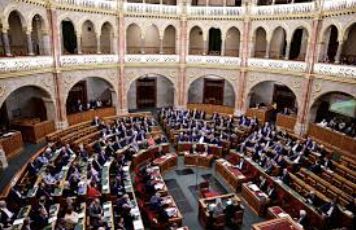Hungary's Delay in Ratifying Sweden's NATO Membership and Ties with Russia Strain Relations with US
The United States supports Sweden's bid to join NATO, with assurances from Hungary's government. However, strained relations persist due to Hungary's ties with Russia and proposed sovereignty protection bill.
The United States is optimistic about Sweden's soon-to-be membership in NATO, according to the U.S. ambassador to Hungary. Mending strained relations between Budapest and Washington, Hungary has assured the U.S. that it will not be the last country to ratify Sweden's NATO request. However, Hungary's delay in ratifying Sweden's membership, as well as Prime Minister Viktor Orban's close ties with Moscow despite the conflict in Ukraine, have strained relations with the U.S. Ambassador David Pressman confirmed that he had received assurances from the senior-most levels of the Hungarian government regarding the ratification of Sweden's accession to NATO.
I wonder why @PM_ViktorOrban is 'not ready' to accept #Sweden in NATO? 🤔🤔🤔🤔https://t.co/2aTZGRtXb1#Hungary #dictatorssticktogether #Russia #PutinIsaWarCriminal #Ukraine #NATO pic.twitter.com/DHIEXPmU7r
— MEP Vlad Gheorghe (@VladDanGheorghe) November 16, 2023
Although both Hungary and Turkey still need to ratify Sweden's membership, Pressman was confident in Hungary's commitment. Despite Hungary's opposition to Russia's invasion of Ukraine, Prime Minister Orban has maintained strong ties with Moscow, partly due to Hungary's energy dependence on Russia. Orban has refrained from condemning President Vladimir Putin's policies. In April, the U.S. imposed sanctions on a Russian bank with its headquarters in Budapest, urging Hungary to sever ties with the "opaque Kremlin-controlled platform." Shortly after the penalties were imposed, Hungary withdrew from the bank. Pressman also expressed concern over a sovereignty protection bill proposed by Hungary's ruling party, Fidesz.
The U.S. ambassador has a history of clashing with the Hungarian government on various issues, including LGBT rights and Orban's meeting with Putin. The bill, which was expected to be submitted to parliament by Fidesz, was postponed. In September, a Fidesz lawmaker suggested that the bill could target political parties, quasi-civil groups, and left-wing journalists as a means to combat foreign influence. Pressman warned that if the bill sought to criminalize or intimidate independent civil society and media organizations, it would be a dangerous path for Hungary to take. He expressed hope that Hungary would not choose this path.




